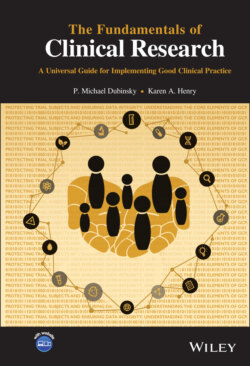Читать книгу The Fundamentals of Clinical Research - P. Michael Dubinsky - Страница 67
5.3 Regulatory Affairs
ОглавлениеThe regulatory affairs organizational group in a drug/pharmaceutical firm is always assigned as the primary point of contact for interactions with competent authorities. Therefore, a representative from the group should be part of the clinical development core team from the beginning of any clinical development initiative. Regulatory affairs will not be the only group or person that communicates with a regulatory or competent authority but they must be aware of all communications and in most situations will review the substance of communications for consistency with company and regulatory policy.
The functional responsibilities that are assigned to Regulatory Affairs include all marketing and development related applications for a pharmaceutical drug including amendments and supplements to those applications. Regulatory affairs will also be responsible for coordinating the assembly of data and information used to support the various applications. In the case of drug development applications such as an FDA Investigational New Drug (IND) Application regulatory affairs will likely be the conduit for all communications with the regulatory authority whether electronic (e.g. video conference/phone), written, or face‐to‐face. Having a central point of contact and it being a regulatory affairs group is an approach which is favored by the regulatory authorities. They prefer to have one central point of contact for communications. It is also in the best interests of a firm to have communications processed through a central coordination point. That way there is institutional knowledge and awareness of what is being communicated, how it fits with what has been previously communicated and an understanding of the impact, if any, that the information being transmitted will have on the program, project, or application involved. There may be times when the information is communicated by an organizational group other than regulatory affairs an example being pharmacovigilance/adverse experience reports. Even then the regulatory affairs group needs to be involved to ensure continuity and completeness.
So how does that intersect with meeting GCP expectations?
Basically, the regulatory affairs staff in a firm are charged with ensuring that the information and data reported on applications for pharmaceutical drug development is accurate, complete, original, and supported by facts. They are expected to sign off on all submissions to regulatory authorities and by doing so they guarantee the veracity and soundness of the information being submitted. In theory they could be held personally responsible for any inaccuracy, untruth, or omission found as part of a submission. Does that mean they double check all information? They might in some situations. The reality is that knowledgeable and seasoned regulatory affairs staff members have an in‐depth working knowledge of all the elements of the drug development processes and they practice a policy of accept and verify. They receive and/or request information from members of the drug development team to populate a submission but then perform verification on a portion of the data to be sure of accuracy and completeness. It is part of their training and job to know, understand, and be fluent in GCP as well as other GXP requirements.
